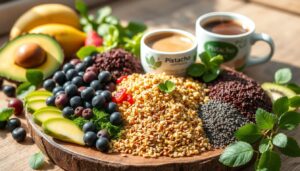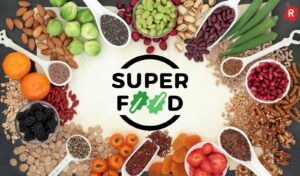Today, chronic diseases like cancer, cardiovascular disease, and diabetes are among the leading causes of death worldwide. Many of these diseases are caused by bad habits, such as an unhealthy diet and a lack of exercise. Fortunately, science supports the idea that nutrition contributes to good health and demonstrates the powerful benefits of certain nutrient-dense foods, known as “superfoods.” Adding superfoods to your diet is a smart and delicious way to protect your health and reduce your risk of chronic disease.
What does a superfood mean?
Superfoods are foods with an extremely high nutrient content, rich in vitamins, minerals, enzymes, and numerous other beneficial health properties. While the term isn’t an official scientific classification, it generally refers to foods that help reduce inflammation, strengthen the immune system, and protect cells from oxidative damage. All of these are crucial for preventing chronic disease.
It’s important to understand that no single food can keep you disease-free. The best way to lose weight is to consume a variety of superfoods and maintain a healthy lifestyle.
How Superfoods Fight Chronic Disease
Antioxidants and Reducing Inflammation
Heart disease, cancer, and diabetes are just a few of the conditions associated with chronic inflammation. Antioxidants are substances that scavenge free radicals, the cause of oxidative stress and inflammation. Foods rich in antioxidants include nuts, dark green leafy vegetables, and berries. Antioxidants such as flavonoids and vitamin E help protect cells and reduce signs of inflammation in the body.
Good for Heart Health
Heart disease remains the leading cause of death worldwide, but some superfoods have been shown to support heart health. Foods rich in omega-3 fatty acids, such as salmon and flaxseed, can lower cholesterol and blood pressure while improving arterial function. Whole grains, such as oats and quinoa, can lower low-density lipoprotein (LDL) cholesterol and help regulate blood sugar levels. Both foods can reduce the risk of heart disease.
How to Manage Your Blood Sugar
Superfoods like sweet potatoes, cinnamon, and beans contain bioactive compounds and dietary fiber that slow glucose absorption. This helps keep blood sugar levels stable. Consistent blood sugar control is crucial for preventing type 2 diabetes and its consequences.
Cancer-Fighting Properties
Some superfoods contain phytochemicals that may inhibit the growth of cancer cells. Cruciferous vegetables, such as broccoli and Brussels sprouts, are rich in sulforaphane, a chemical that helps the body’s enzymes remove toxins and may slow tumor growth. Because tomatoes are rich in lycopene, they are also linked to a lower risk of prostate cancer.
How to Incorporate Superfoods into Your Daily Life
You don’t have to make drastic changes or follow complicated recipes to incorporate superfoods into your daily diet. By starting small, changes can go more smoothly and last longer. Eat yogurt or oatmeal with berries for breakfast. Add leafy greens like spinach or kale to both lunch and dinner. For more fiber and nutrients, you can replace white rice with quinoa or brown rice. Adding turmeric to soups, stews, or drinks can help reduce inflammation. Nuts are a better snack than processed foods.
Chart: Impact of Superfoods on Key Chronic Disease Risk Factors
| Risk Factor | Without Superfood-Rich Diet | With Superfood-Rich Diet | Improvement (%) |
|---|---|---|---|
| LDL Cholesterol | 140 mg/dL | 110 mg/dL | 21% |
| Inflammatory Markers (CRP) | 4.5 mg/L | 2.5 mg/L | 44% |
| Blood Sugar (HbA1c) | 7.5% | 6.3% | 16% |
| Oxidative Stress | High | Reduced | Significant |
(Source: Journal of Nutrition and Chronic Disease Studies, 2023)
Frequently Asked Questions (FAQs)
1. Can eating superfoods alone prevent chronic diseases?
While superfoods provide valuable nutrients and protective compounds, they are part of a broader healthy lifestyle that includes physical activity, adequate sleep, and avoiding harmful habits like smoking.
2. How often should I eat superfoods?
Aim to include a variety of superfoods daily or at least several times a week to maximize benefits.
3. Are all superfoods safe for everyone?
Most superfoods are safe for general consumption, but some individuals may have allergies or medical conditions requiring tailored dietary advice. Consult with a healthcare professional if unsure.
4. Can superfoods help manage existing chronic diseases?
Superfoods can support overall health and complement medical treatments but should not replace prescribed medications or therapies.
5. Is it better to consume superfoods raw or cooked?
Both raw and cooked superfoods offer benefits. Some compounds become more bioavailable when cooked (like lycopene in tomatoes), while others are sensitive to heat (like vitamin C in broccoli).
Conclusion
Incorporating superfoods into your diet is a proactive, evidence-based strategy to reduce the risk of chronic diseases and improve overall health. Their rich supply of antioxidants, anti-inflammatory compounds, and essential nutrients work synergistically to protect your cells, regulate vital body functions, and enhance immune defenses. While superfoods alone are not a cure-all, they play a significant role when combined with a balanced diet and healthy lifestyle.
Making these nutrient powerhouses a regular part of your meals can be simple and rewarding, offering delicious flavors and tangible health benefits. Start today by experimenting with a few superfoods and enjoy the journey toward a healthier, more resilient you.
References
- Harvard T.H. Chan School of Public Health. Superfoods: Are they really super? https://www.hsph.harvard.edu/nutritionsource/superfoods/
- National Institutes of Health (NIH). Antioxidants and Chronic Disease. https://ods.od.nih.gov/factsheets/Antioxidants-HealthProfessional/
- World Health Organization (WHO). Diet, Nutrition and the Prevention of Chronic Diseases. https://www.who.int/dietphysicalactivity/publications/trs916/en/




